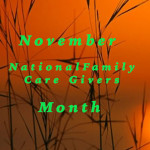A November Reminder About Falling

“November is National Family Caregivers Month” – Falling
“Help, I’ve fallen and I can’t get up.” Although many people associate medical alert systems with the almost comically morbid commercials that brought them to prominence in the late 1980s, but for the more than 12 million seniors who live alone in the United States, and their families, the security and peace of mind they offer is no laughing matter.
One-third of community-dwelling seniors and 60% of nursing home residents fall every year. More than 90% of hip fractures result from falls, they are the leading cause of injury-related hospital admissions in people over age 65, and account for more than 70% of accidental deaths in people 75 years of age and older. But while these statistics are startling, still they’re often not enough to convince elderly persons to wear a medical alert device. ConsumerAffairs understands that talking to an elderly loved one about accepting any form of assistance can be difficult. That’s why the consumer news and reviews website tapped its community of reviewers and the thousands of reviews they’ve left about medical alert devices, for insights and advice on how adult children can have a candid, yet respectful conversation with their elderly parents about getting one.
Reinforce the risks of living alone
For many elderly people, medical alert devices are symbols of the age, dependence and sense of frailty they’ve worked hard to avoid.
“My daughter feels that I need a medical alert device because I like to go out and work in the yard and do things that she thinks I’m too old to do,” wrote Joanne of Spartanburg, SC.
Highlighting the risk of injury is an effective, if not altogether reassuring way of encouraging their aging parents to consider a medical alert device. When seniors and their families decide it is no longer safe to stay at home alone, wearing a medical alert device can help prolong an elderly relatives’ independence.
Tell them a medical alert device will give family members peace of mind
Even if your elderly parent insists they don’t really need a medical alert device, one effective argument the company found repeated by its users was that the peace of mind it provides is less for the elderly wearer, but for their family and fiends.
“My daughter insisted that I get the medical alert device after I got a pacemaker,” said Yvonne of Seattle, WA. “ I told her I didn’t need it, but she said, ‘Well I’m not getting it for you. I’m getting it for me.’ She has often said that when I am wearing this, she doesn’t have to worry about me.”
Martha of Denver, CO, continued: “I resisted and thought I didn’t need this, and then realized it is sensible insurance. My adult kids agree. It’s the kind of service you hope you never have to use.”
Offer to make the arrangements for them
ConsumerAffairs found that if the children take care of all the arrangements the elderly parent is more likely to agree to a medical alert device. The details of payment, ordering and setup can scare them away from taking the next step. A medical alert device could be a great gift. Cost is often a major factor when looking into a medical alert system. ConsumerAffairs’ medical alert systems guide offers insights on the different types of companies and pricing options for consumers.
Help them remain independent
Although they may have been reluctant at first, many seniors find wearing a medical alert device increases their confidence and allows them to do things they would have avoided before.
“Now I’m more independent because I go outside an awful lot and I have the security of having the wristband and I know that somebody will come if I have to use it. I feel secure with it,” said Theresa of Dayton, OH.
Continued Gail of Clearwater, FL: “I’ve had my necklace alarm for 3 months and it gives me peace of mind that I am not alone.”
The “just in case” aspect can be very convincing when talking to a loved one about getting a device. How reassuring that if you press the device after a fall or accidents help will be there within minutes.
More than 12 millions seniors now live alone in the United States. Caregivers of aging parents or loved ones who are ill may find great relief to know that if an accident occurs, their loved one will be able to receive help quickly. You can learn more in this Medical Alert video
About ConsumerAffairs.com: Listed among the top 600 websites in the United States, ConsumerAffairs.com offers free resources, news and tools for more than 8 million visitors each month. A leader in consumer advocacy, ConsumerAffairs has been featured in a number of prominent media outlets including The New York Times, CNN, Forbes and AARP. For more information, visit www.ConsumerAffairs.com or contact Natalie Donohue at (918) 236-6032.
Category: Articles



































